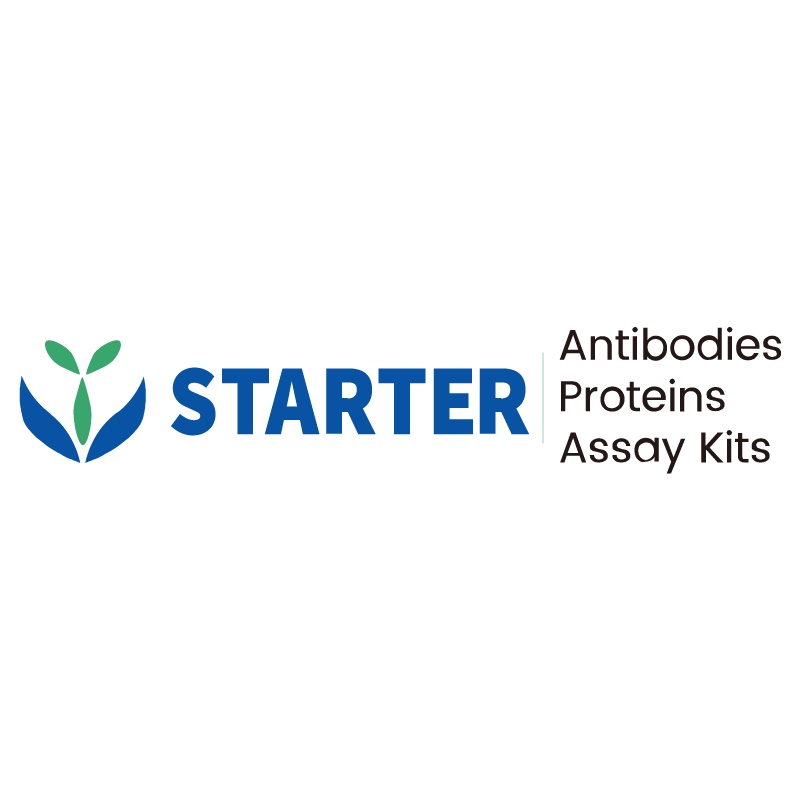WB result of BACE1 Recombinant Rabbit mAb
Primary antibody: BACE1 Recombinant Rabbit mAb at 1/1000 dilution
Lane 1: RAW264.7 whole cell lysate 20 µg
Lane 2: Neuro-2a whole cell lysate 20 µg
Lane 3: mouse brain lysate 20 µg
Negative control: RAW264.7 whole cell lysate
Secondary antibody: Goat Anti-rabbit IgG, (H+L), HRP conjugated at 1/10000 dilution
Predicted MW: 56 kDa
Observed MW: 70 kDa
This blot was developed with high sensitivity substrate
Product Details
Product Details
Product Specification
| Host | Rabbit |
| Antigen | BACE1 |
| Synonyms | Beta-secretase 1; Aspartyl protease 2 (ASP2; Asp 2); Beta-site amyloid precursor protein cleaving enzyme 1 (Beta-site APP cleaving enzyme 1); Memapsin-2; Membrane-associated aspartic protease 2; Bace1; Bace |
| Immunogen | Synthetic Peptide |
| Location | Lysosome, Endosome, Cell membrane, Endoplasmic reticulum |
| Accession | P56818 |
| Clone Number | S-2514-34 |
| Antibody Type | Recombinant mAb |
| Isotype | IgG |
| Application | WB, IHC-P |
| Reactivity | Hu, Ms, Rt |
| Positive Sample | Neuro-2a, mouse brain, PC-12, rat brain |
| Predicted Reactivity | Bv, GP |
| Purification | Protein A |
| Concentration | 2 mg/ml |
| Conjugation | Unconjugated |
| Physical Appearance | Liquid |
| Storage Buffer | PBS, 40% Glycerol, 0.05% BSA, 0.03% Proclin 300 |
| Stability & Storage | 12 months from date of receipt / reconstitution, -20 °C as supplied |
Dilution
| application | dilution | species |
| WB | 1:500-1:1000 | Ms, Rt |
| IHC-P | 1:200-1:1000 | Hu, Ms, Rt |
Background
BACE1 (β-site amyloid precursor protein cleaving enzyme 1), a 501-residue type-I transmembrane aspartyl protease encoded by the BACE1 gene on chromosome 11q23.3, is the rate-limiting enzyme that initiates amyloid-β (Aβ) generation by cleaving APP at the β-secretase site within acidic endosomes; its activity is highest in neurons, modulated by post-translational glycosylation, phosphorylation and trafficking to lipid rafts, and is tightly regulated by spatial segregation, endogenous inhibitors like BRI2, and a short isoform BACE1-457 that lacks the catalytic domain; genetic deletion or pharmacological inhibition in rodents reduces Aβ pathology and reverses synaptic deficits with minimal toxicity, making BACE1 a prime yet challenging therapeutic target for Alzheimer’s disease, although clinical trials have been complicated by mechanism-based side effects including retinal and cognitive abnormalities due to cleavage of additional substrates such as neuregulin-1, sodium channel β-subunits and seizure-related proteins.
Picture
Picture
Western Blot
WB result of BACE1 Recombinant Rabbit mAb
Primary antibody: BACE1 Recombinant Rabbit mAb at 1/1000 dilution
Lane 1: PC-12 whole cell lysate 20 µg
Lane 2: rat brain lysate 20 µg
Secondary antibody: Goat Anti-rabbit IgG, (H+L), HRP conjugated at 1/10000 dilution
Predicted MW: 56 kDa
Observed MW: 65, 75 kDa
This blot was developed with high sensitivity substrate
Immunohistochemistry
IHC shows positive staining in paraffin-embedded human glioblastoma. Anti-BACE1 antibody was used at 1/200 dilution, followed by a HRP Polymer for Mouse & Rabbit IgG (ready to use). Counterstained with hematoxylin. Heat mediated antigen retrieval with Tris/EDTA buffer pH9.0 was performed before commencing with IHC staining protocol.
IHC shows positive staining in paraffin-embedded mouse hippocampus. Anti-BACE1 antibody was used at 1/100 dilution, followed by a HRP Polymer for Mouse & Rabbit IgG (ready to use). Counterstained with hematoxylin. Heat mediated antigen retrieval with Tris/EDTA buffer pH9.0 was performed before commencing with IHC staining protocol.
Negative control: IHC shows negative staining in paraffin-embedded mouse liver. Anti-BACE1 antibody was used at 1/100 dilution, followed by a HRP Polymer for Mouse & Rabbit IgG (ready to use). Counterstained with hematoxylin. Heat mediated antigen retrieval with Tris/EDTA buffer pH9.0 was performed before commencing with IHC staining protocol.
IHC shows positive staining in paraffin-embedded rat hippocampus. Anti-BACE1 antibody was used at 1/100 dilution, followed by a HRP Polymer for Mouse & Rabbit IgG (ready to use). Counterstained with hematoxylin. Heat mediated antigen retrieval with Tris/EDTA buffer pH9.0 was performed before commencing with IHC staining protocol.
Negative control: IHC shows negative staining in paraffin-embedded rat liver. Anti-BACE1 antibody was used at 1/100 dilution, followed by a HRP Polymer for Mouse & Rabbit IgG (ready to use). Counterstained with hematoxylin. Heat mediated antigen retrieval with Tris/EDTA buffer pH9.0 was performed before commencing with IHC staining protocol.


